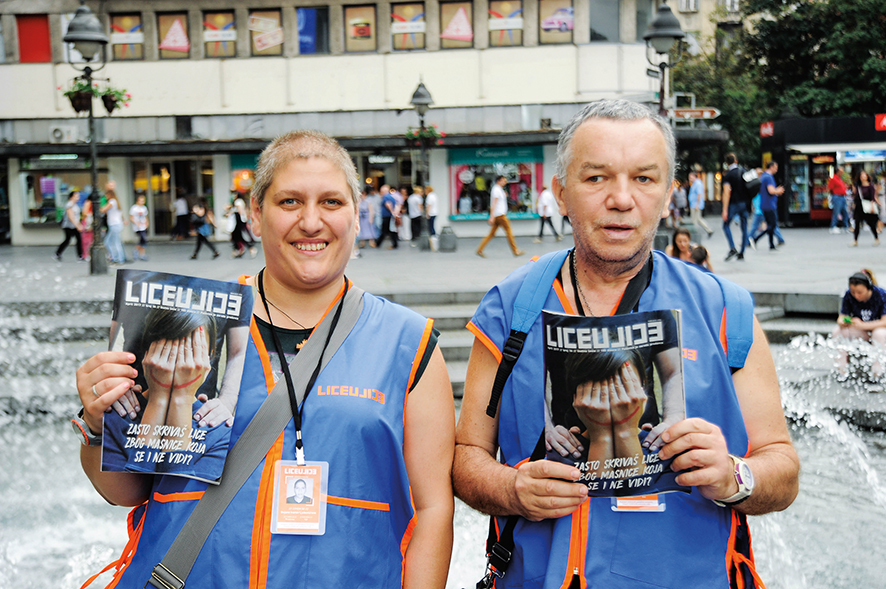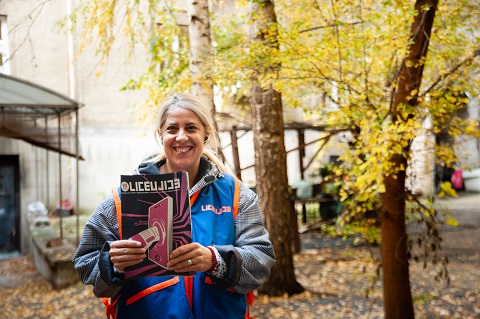Bojana Ivanov Ljubomirov and Petar Jugovic are emotional-business partners, as they call themselves, and they complement each other perfectly. When it comes to selling Liceulice, Bojana is responsible for marketing and Petar takes care of the accounting. They say that they are progressing and gaining confidence through their work.
Petar is reticent and patient by nature and offers much-needed support to his partner. Bojana, a much more open personality, helps to introduce Petar to new worlds and to different dimensions of life that he has been unfamiliar with so far.
What happened before they met is not worth talking about with them, except as an introduction to the here and now. The couple found in each other the other half of themselves, which is something that many seek when it comes to love. Supplementing their love are the things that they have gained as a result of their joint work as Liceulice vendors. The magazine brought them financial stability, but, more importantly, selling the magazine has given them back the confidence that had been fundamentally shaken by illness. Magazine sales have proved to the couple that they can do anything in their lives.
The couple found in each other the other half of themselves, which is something that many seek when it comes to love.
The couple met seven years ago at a mental health services clinic. In December, they celebrated the second anniversary of their relationship. “I spent a couple of weeks at the hospital to have surgery for a tumour on my uterus, and Peter was visiting me daily,” Bojana says. “Afterwards, he moved to my place to take care of me, and since then we have been inseparable.” Bojana smiles broadly as she tells me this story; her smile transforms her face from curious to cheerful.
Humour is her weapon: she uses it in every situation and uses it to relieve the tension that she experiences. She used it when she was in hospital and thus boosted the morale of everyone around her. A wide smile is also her main asset when it comes to communicating with Liceulice customers. “Who would stop if I looked unapproachable?” she asks.
A smile is followed by a kind word, which breaks down any other remaining barriers and makes passers-by, who are otherwise occupied with their problems, interested in Bojana. “By purchasing a copy of the magazine, you not only become familiar with the different ways of fighting for human rights,” she says, “but you also actively help the sick and other people from the margins of society.”
As the couple’s pitch is on Knez Mihailova Street [Belgrade’s main pedestrian shopping area], Bojana and Petar often meet foreigners. People with the right to stay in the country claim that Liceulice helps them to learn Serbian and they buy it regularly for this reason. For others, who are only staying in the country for a short time, Bojana and Petar speak to them in English and suggest that a copy of the magazine could be a souvenir from Belgrade. Bojana recognizes non-Serbian customers easily by their cameras, ranchers, hats… or by the fact that they have “a blush of the southern sun”, as she puts it. Germans, Slovaks, Czechs and other north-western customers have stayed in Bojana’s mind as vividly as her memories of the beaches in Poreč, where she spent the summer holidays when she was a little girl.
When it is time to give customers their change back, Petar takes over. For someone who worked in the commercial sector for twenty-two years, these financial calculations are very easy. “While I was still selling Liceulice by myself, money puzzled me,” Bojana admits. For Petar, he found it difficult to establish contact with potential customers when he was working alone. United, the couple are unbeaten and by working together every day in this way, the pair sell twenty magazines.

The money that they earn by selling Liceulice helps the couple to pay for their grocery shopping. They use Petar’s pension and Bojana’s social assistance to pay for their utilities. The family budget is contributed to by the family – Petar’s sisters, Bojana’s brother and mother – and any surplus that the couple has is used to travel or to give little surprises to their loved ones. Who is happier when these small gifts are exchanged – Bojana or her mother or Bojana and one of her friends? And the occasion? Love. The present usually takes the form of a book, with some other little item alongside.
“I love to read,” says Bojana. “Sometimes I cannot leave a book for the entire day.” Bojana is a former student of landscape design and was forced to drop out of college due to a worsening of her health due to schizophrenia. She had attacks earlier in her life: she suffered manic episodes, heard voices, experienced hallucinations and was obsessed by suicidal thoughts. “Once I took six packs of pills in order to kill myself,” Bojana tells me. “When I came out of the coma, I woke up in hospital with the clear thought that I was saved by God’s grace.” Bojana credits her attempt to “shorten the torment” with introducing her to her faith.
“Sometimes I am short tempered, while Petar has a lot more patience,” Bojana says. Her insights into own faults enable her to praise her partner. He is the most important thing in life for her, after her devotion to God, and he is followed by mother, father, stepfather, stepmother, brother, sister-in-law and all of her friends. Petar has always been religious, in “his own way”, but his beloved “led him to the right path”, he says. Thus, the couple are similar in this regard. When they travel, their destinations are usually monasteries.
At home, chores are divided according to their personal preferences. Bojana cooks and cleans, while Peter does the grocery shopping and does the dishes. They read together: Bojana describes a scene where both are sitting in separate armchairs with a book and the hours pass in complete silence. During that time, both of them are in their separate worlds of thriller plot twists, historical heroes and grand biographies, yet still together. They avoid watching TV, because the programmes are “full of kitsch, poor taste, replays of films and negative information”, they tell me.
The attraction that blossomed between the couple has completely changed their lives and filled them with constant joy.
During the interview, the couple do not hold hands, although they usually do when they are walking down the street (that is, if their hands are not full of magazines or gifts for someone). They exchange tenderness by glancing at each other and through sporadic compliments, and their mutual sympathy can always be felt in the air.
The attraction that blossomed between the couple has completely changed their lives and filled them with constant joy. It was not that they had been deprived of joy before, but that the periods of joy were punctuated by moments of hardship. As soon as the couple experienced the joy of being together, they felt that it was possible to increase their happiness by being involved with others. For this reason, one of the most important things for them is friendship. They spread joy among their circle of friends by inviting them to enjoy home-made food with them, such as specialties from Persia, Greece, Bulgaria and other exotic cuisines.
The couple share something else, too: the absence of great desires, because everything that they need they already have. They have each other, which is something that has led them to keep moving forward in life. Together, they feel that they are socially useful – not “bums”.
This feeling is worth almost as much the love they have for each other, Bojana and Petar tell me.
Translated from Serbian by Marijana Rakic




















